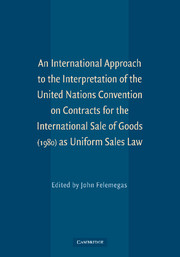Book contents
- Frontmatter
- Contents
- Foreword, by Eric E. Bergsten
- Contributors
- PART ONE INTRODUCTION
- PART TWO CISG–UNIDROIT Principles comparative editorials
- Art. 6 CISG–UP, by Bojidara Borisova [Bulgaria]
- Art. 7 CISG–UP, by Ulrich Magnus [Germany]
- Art. 8 CISG–UP, by Joseph M. Perillo [U.S.A.]
- Art. 9 CISG–UP, by Jorge Oviedo Alban [Colombia]
- Art. 10 CISG–UP, by Allison E. Butler [U.S.A.]
- Art. 11 CISG–UP, by Chantal Niggemann [Germany]
- Art. 13 CISG–UP, by Andrea Charters [U.S.A.]
- Art. 14 CISG–UP, by Jorge Oviedo Alban [Colombia]
- Art. 16 CISG–UP, by Andrea Vincze [Hungary]
- Art. 17 CISG–UP, by Stephen Smith [U.S.A.]
- Art. 18 CISG–UP, by Jorge Oviedo Alban [Colombia]
- Art. 20 CISG–UP, by John Felemegas [Australia]
- Art. 21 CISG–UP, by John Felemegas [Australia]
- Art. 22 CISG–UP, by John Felemegas [Australia]
- Art. 24 CISG–UP, by John Felemegas [Australia]
- Art. 25 CISG–UP, by Robert Koch [Germany]
- Arts. 26/39 CISG–UP–PECL, by Camilla Baasch Andersen [Denmark]
- Art. 27 CISG–UP–PECL, by Chengwei Liu [China]
- Arts. 28, 46, 62 CISG–UP, by John Felemegas [Australia]
- Art. 29 CISG–UP, by Sieg Eiselen [South Africa]
- Art. 35 CISG–UP–PECL, by René Franz Henschel [Denmark]
- Art. 37 CISG–UP, by Bertram Keller [Germany]
- Arts. 47/49 CISG–UP, by Robert Koch [Germany]
- Art. 48 CISG–UP, by Chris Kee [Australia]
- Art. 55 CISG–UP, by Jumpita Ruangvichatron [Thailand]
- Arts. 63/64 CISG–UP, by Robert Koch [Germany]
- Arts. 71/72 CISG–UP, by Sieg Eiselen [South Africa]
- Art. 74 CISG–UP, by Sieg Eiselen [South Africa]
- Art. 75 CISG–UP, by Bojidara Borisova [Bulgaria]
- Art. 76 CISG–UP, by Bruno Zeller [Australia]
- Art. 77 CISG–UP, by Elisabeth Opie [Australia]
- Art. 78 CISG–UP, by Sieg Eiselen [South Africa]
- Art. 79 CISG–UP, by Alejandro M. Garro [Argentina]
- Art. 80 CISG–UP, by Friederike Schäfer [Germany]
- Arts. 81/82 CISG–UP, by Florian Mohs [Switzerland]
- PART THREE CISG–PECL COMPARATIVE EDITORIALS
- Index
Art. 18 CISG–UP, by Jorge Oviedo Alban [Colombia]
Published online by Cambridge University Press: 20 October 2009
- Frontmatter
- Contents
- Foreword, by Eric E. Bergsten
- Contributors
- PART ONE INTRODUCTION
- PART TWO CISG–UNIDROIT Principles comparative editorials
- Art. 6 CISG–UP, by Bojidara Borisova [Bulgaria]
- Art. 7 CISG–UP, by Ulrich Magnus [Germany]
- Art. 8 CISG–UP, by Joseph M. Perillo [U.S.A.]
- Art. 9 CISG–UP, by Jorge Oviedo Alban [Colombia]
- Art. 10 CISG–UP, by Allison E. Butler [U.S.A.]
- Art. 11 CISG–UP, by Chantal Niggemann [Germany]
- Art. 13 CISG–UP, by Andrea Charters [U.S.A.]
- Art. 14 CISG–UP, by Jorge Oviedo Alban [Colombia]
- Art. 16 CISG–UP, by Andrea Vincze [Hungary]
- Art. 17 CISG–UP, by Stephen Smith [U.S.A.]
- Art. 18 CISG–UP, by Jorge Oviedo Alban [Colombia]
- Art. 20 CISG–UP, by John Felemegas [Australia]
- Art. 21 CISG–UP, by John Felemegas [Australia]
- Art. 22 CISG–UP, by John Felemegas [Australia]
- Art. 24 CISG–UP, by John Felemegas [Australia]
- Art. 25 CISG–UP, by Robert Koch [Germany]
- Arts. 26/39 CISG–UP–PECL, by Camilla Baasch Andersen [Denmark]
- Art. 27 CISG–UP–PECL, by Chengwei Liu [China]
- Arts. 28, 46, 62 CISG–UP, by John Felemegas [Australia]
- Art. 29 CISG–UP, by Sieg Eiselen [South Africa]
- Art. 35 CISG–UP–PECL, by René Franz Henschel [Denmark]
- Art. 37 CISG–UP, by Bertram Keller [Germany]
- Arts. 47/49 CISG–UP, by Robert Koch [Germany]
- Art. 48 CISG–UP, by Chris Kee [Australia]
- Art. 55 CISG–UP, by Jumpita Ruangvichatron [Thailand]
- Arts. 63/64 CISG–UP, by Robert Koch [Germany]
- Arts. 71/72 CISG–UP, by Sieg Eiselen [South Africa]
- Art. 74 CISG–UP, by Sieg Eiselen [South Africa]
- Art. 75 CISG–UP, by Bojidara Borisova [Bulgaria]
- Art. 76 CISG–UP, by Bruno Zeller [Australia]
- Art. 77 CISG–UP, by Elisabeth Opie [Australia]
- Art. 78 CISG–UP, by Sieg Eiselen [South Africa]
- Art. 79 CISG–UP, by Alejandro M. Garro [Argentina]
- Art. 80 CISG–UP, by Friederike Schäfer [Germany]
- Arts. 81/82 CISG–UP, by Florian Mohs [Switzerland]
- PART THREE CISG–PECL COMPARATIVE EDITORIALS
- Index
Summary
ACCEPTANCE OF AN OFFER
Under the Convention and also under the UNIDROIT Principles, the contract is concluded when an offer is accepted. Art. 18(1) of the Convention defines acceptance in the following terms:
A statement made by or other conduct of the offeree indicating assent to an offer is an acceptance. Silence or inactivity does not in itself amount to acceptance.
Thus, the acceptance must be in the form of an active assent to an offer. Art. 2.6(1) of the UNIDROIT Principles defines acceptance in an identically worded provision:
A statement made by or other conduct of the offeree indicating assent to an offer is an acceptance. Silence or inactivity does not in itself amount to acceptance.
In general, it is accepted that under both instruments the contract is perfected when the offer and the acceptance coincide. The acceptance may be given in several ways, and it does not necessarily have to consist of an expressed act of declaration of will. Both the Convention and the Principles establish that the acceptance can consist of a declaration or an act of the offeree that indicates assent.
MODE OF ACCEPTANCE
Express acceptance
The acceptance of an offer can be express or tacit. The first is expressly presented as the assent of the offeree. The second, when it is an act that constitutes acceptance, is expressed by means of acts that denote such an assent (i.e., acts of contractual execution). This form of acceptance has been called “acceptance by conduct or an act of dominion.”
- Type
- Chapter
- Information
- Publisher: Cambridge University PressPrint publication year: 2007
- 1
- Cited by

